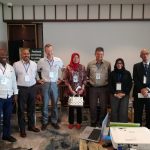Sustainable management of peatlands in the ASEAN region: the catalytic role of GEF financing in launching a large-scale programme

For ten years IFAD has been working in partnership with the Global Environment Facility (GEF) to combat peatland fires and haze pollution by fostering sustainable peatland management in the Association of Southeast Asian Nations (ASEAN) region in collaboration with the EU and the Global Environment Centre (GEC).
This collaboration was the subject of an IFAD-led event at the Sixth GEF Assembly in Da Nang, Vietnam.
Opening the event, Margarita Astralaga, Director of the Environment, Climate, Gender and Social Inclusion Division at IFAD said that the forests of southeast Asia are one of the most important ecosystems in the world and we need to protect them, but also help people who live there have better lives.
"IFAD has partnered on this for around ten years with the GEF and others and we have been building on this knowledge as we go, we have learnt what works and what doesn't," said Astralaga.
Moderating the event, Mohamed Bakarr, Lead Environmental Specialist at the GEF said that he was excited about the strong partnership with IFAD.
"But today we need to look at how we solve the problem and deal with whats driving it to start with," added Bakarr.
Annual land clearance in Indonesia and Malaysia using fire by smallholder farmers and big plantations creates a thick blanket of haze covering three million square kilometres of Southeast Asia affecting over 50 million people.

This phenomenon has been increasing in intensity over the last ten years. In the 2015/16 El Nio event, 100,000 premature deaths, massive greenhouse gas emissions, large-scale deforestation and dramatic economic losses (over US$30 billion in Indonesia alone) were experienced.
The ASEAN Peatland Forests Project (APFP 2009 - 2014) was IFAD's first project on sustainable peatland and haze management, and was financed from GEF4 and implemented together with the ASEAN and GEC.
Building on that experience, IFAD developed the GEF5 Sustainable Management of Peatland Ecosystems in Indonesia (SMPEI) project and is finalising the design of the GEF6 Integrated Management of Peatland Landscapes in Indonesia (IMPLI) project.
IFAD has developed a GEF6 project in Malaysia titled Sustainable Management of Peatland Ecosystems in Malaysia (SMPEM). IFAD supported IUCN with developing the Sustainable Management of Peatland Ecosystems in Mekong Countries project.
As a means for continuing the ASEAN regional platform developed under APFP, and for coordinating and exchanging knowledge between the country projects, IFAD approved a regional grant of US$3.5 million to the ASEAN Secretariat called Measurable Action for Haze-Free Sustainable Land Management in Southeast Asia (MAHFSA).
The MAHFSA project seeks to develop an estimated US$1.5 billion investment programme focusing on haze elimination and sustainable peatland management anchored in country and regional level activities.
"There's a lot of change happening, so its the right moment for us to look at how to scale up actions," said IFAD's Roshan Cooke.
Jake Brunner from IUCN reminded us that peatlands are highly valuable ecosystems for biodiversity conservation providing ecosystems services, and that there are still threats out there.
"In some of the regions we work in plans to expand the rice production area are threatening peatlands," added Brunner.
Meanwhile, the GEC's Faizal Parish underlined that peatlands are critical for people, water, biodiversity and carbon storage.
"Previously people thought if it's wet drain it," said Parish. "But now we know better than that You must have an integrated landscape approach to peatlands and stop new drainage.
Parish explained that we must raise water tables to fight peatland fires. "If we get the hydrology right then nature does the work."
The side event looked at the catalytic role GEF finances have played in leveraging a large-scale programme of work focused on making significant improvements in peatland protection and management, and haze elimination, and in helping bring together a strategic partnership between GEF, IFAD, ASEAN, EU, GIZ, IUCN and GEC.
The event also showcased successful practices from Indonesia, Malaysia and other ASEAN countries on sustainable peatland management.
Ms SPM Budisusanti, from the Indonesian Ministry of Environment and Forestry revealed that her country has already restored 2.5 million hectares of peatland.
"Our latest work will focus on capacity building for sustainable peatland management," said Budisusanti. "The upcoming Sustainable Management of Peatland Ecosystems in Indonesia programme will benefit about 15,000 smallholder farmer households through peatland restoration and better integrated land management."
Mohd. Radhi Chu bin Abdullah from the Malaysian Ministry of Natural Resources and Environment said that in Malaysia they are developing a national action plan for peatlands that contributes to the overall ASEAN action plan.
Mardiah Hayati, from ASEAN, said we have come a long way in building regional mechanisms to deal with transboundary pollution.
"We must share data and knowledge," explained Hayati. "Ministers across the region meet regularly so we at ASEAN look forward to stronger partnerships and further engagement."
(Original article appears on https://ifad-un.blogspot.com/2018/06/sustainable-management-of-peatlands-in.html)#####






